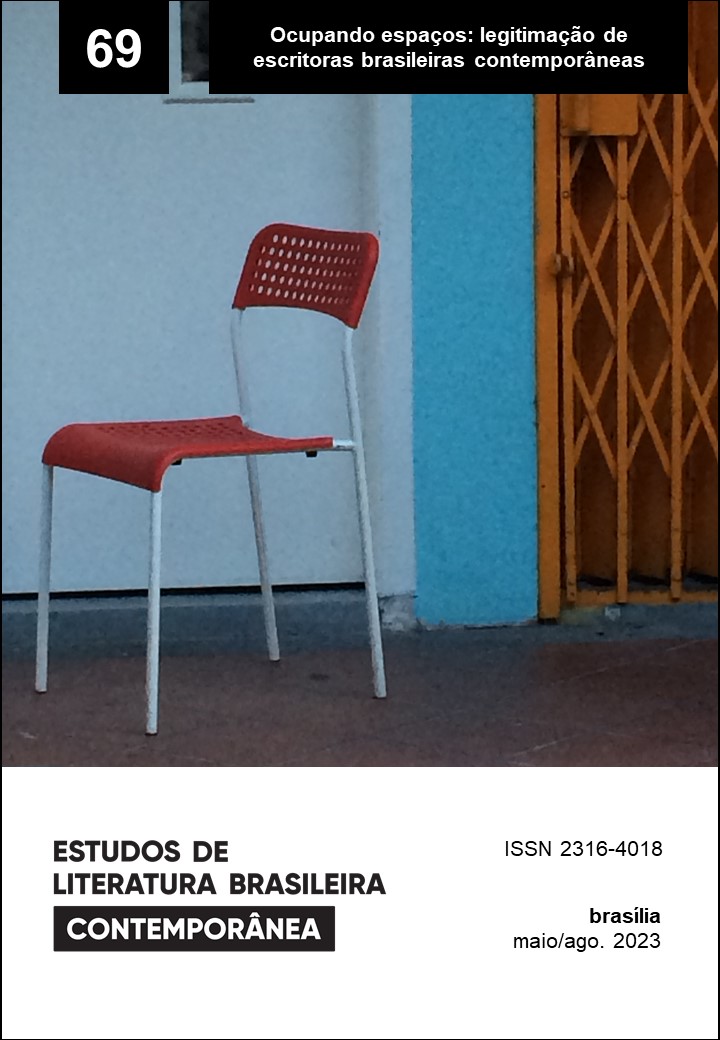Decolonial experiences: Graça Graúna, Mel Duarte, Gabz and Stephanie Borges
Keywords:
decolonial experiences; contemporary poetry; indigeneity; poetry slam; reexistenceAbstract
New speech spaces are new listening spaces. Contemporary poetry is a poetic-political and democratic space, which has as its main concept freedom of expression and free dialogue as a tool for the construction of new horizons. This possibility of dialogue, associated with the reconfiguration of crystallized spaces of speech (colonizing) and listening (colonized), traverses discussions about the empowerment of subalternized groups in their processes of self-affirmation, self-valorization, self-recognition and voicing of suffocated social demands. By perceiving the contemporary scenario as a space of contention, it is important that we pay attention to which voices have been silenced over time and what we can do, how we can act so that they become truly vocal, and not just visual, no longer treated as an object of study of those who, throughout history, have dominated the cultural debate to try to explain the world from a European, or an allegedly European, point of view. In this sense, the indigenous poetry of Graça Graúna, characterized by its indigeneity and the cut-bond metaphor, and the poetry slam of Mel Duarte, Gabz and Stephanie Borges, full of writing-experiences, ancestral references and corporalities, mark the insurrection of a body — individual and collective — that seeks the word as an instrument of struggle and empowerment in the path of decoloniality. For such aesthetic analyses, we used poems from the books Tear da palavra (2007), Querem nos calar: poemas para serem lidos em voz alta (2019), As 29 poetas hoje (2021) and Slam Grito's YouTube channel.
Downloads
References
BERGAMASCHI, Maria Aparecida (2014). Intelectuais Indígenas, Interculturalidade e Educação. Tellus, Campo Grande, v. 14, n. 26, p. 11-29. Disponível em: https://www.tellus.ucdb.br/tellus/article/view/297 Acesso em: 28 nov. 2022.
» https://www.tellus.ucdb.br/tellus/article/view/297
BERTH, Joice (2018). O que é empoderamento? Belo Horizonte: Letramento / Justificando.
BETONI, Camila (2014). O perspectivo ameríndio Disponível em: https://www.infoescola.com/autor/camila-betoni/3295/ Acesso em: 22 ago. 2022.
» https://www.infoescola.com/autor/camila-betoni/3295/
BORGES, Stephanie (2021). Poema. In: HOLLANDA, Heloisa Buarque de (org.). As 29 poetas hoje São Paulo: Companhia das Letras. p. 194-201.
CONCEIÇÃO, Evaristo (2019). Prefácio. In: DUARTE, Mel (org.). Poemas para serem lidos em voz alta Ilustrações de Lela Brandão. São Paulo: Planeta Brasil. p. 5.
DUARTE, Mel (2019). Se querem nos calar, vamos falar mais alto. In: DUARTE, Mel (org.). Poemas para serem lidos em voz alta Ilustrações de Lela Brandão. São Paulo: Planeta Brasil. p. 12.
FREITAS, Daniela Silva de (2018). Ensaios sobre o rap e o slam na São Paulo contemporânea Tese (Doutorado em Literatura, Cultura e Contemporaneidade) – Programa de Pós-graduação em Letras, Pontifícia Universidade Católica do Rio de Janeiro, Rio de Janeiro. Disponível em: https://www.maxwell.vrac.puc-rio.br/34815/34815.PDF Acesso em: 10 dez. 2021.
» https://www.maxwell.vrac.puc-rio.br/34815/34815.PDF
GONZALEZ, Lélia (1988). A categoria político-cultural de amefricanidade. Tempo Brasileiro, Rio de Janeiro, v. 92, n. 93, p. 69-81. Disponível em: https://institutoodara.org.br/public/gonzalez-lelia-a-categoria-politico-cultural-de-amefricanidade-tempo-brasileiro-rio-de-janeiro-v-92-n-93-p-69-82-jan-jun-1988b-p-69-82/ Acesso em: 20 nov. 2022
GRAÚNA, Graça (2007). Tear da palavra Belo Horizonte: Mazza.
GRAÚNA, Graça (2013). Contrapontos da literatura indígena contemporânea no Brasil Belo Horizonte: Mazza.
HALL, Stuart (2003). Da diáspora: identidades e mediações culturais. Belo Horizonte: Editora UFMG.
HOLLANDA, Heloísa Buarque de (2021). As 29 poetas hoje São Paulo: Companhia das Letras.
LÉVY, Pierre (1999). Cibercultura São Paulo: 34.
LUGONES, María (2008). Colonialidade e gênero. Tabula Rasa, n. 9, p. 73-102. Disponível em: https://revistas.unicolmayor.edu.co/index.php/tabularasa/article/view/1501 Acesso em: 1º dez 2022.
» https://revistas.unicolmayor.edu.co/index.php/tabularasa/article/view/1501
MAIA, Bruna Soraia Ribeiro; MELO, Vico Denis Sousa de (2020). A colonialidade do poder e suas subjetividades. Teoria e Cultura, v. 15, n. 2, p. 231-242. https://doi.org/10.34019/2318-101X.2020.v15.30132
» https://doi.org/10.34019/2318-101X.2020.v15.30132
NUNES, Gabrielly (Gabz) (2017). Se pelo menos eu soubesse. Grito Filmes. Disponível em: https://www.youtube.com/watch?v=kZhPvruoeFw Acesso em: 28 jan. 2022.
» https://www.youtube.com/watch?v=kZhPvruoeFw
QUIJANO, Aníbal (2005). Colonialidade do poder, eurocentrismo e América Buenos Aires: Consejo Latinoamericano de Ciencias Sociales.
SANTIAGO, Silviano (1982). O entre-lugar do discurso latino-americano Rio de Janeiro: Rocco.
SANTOS, Ana Carolina Oliveira dos (2019). Meu cabelo não é duro, meu cabelo não é crespo. Portal Geledés Disponível em: https://www.geledes.org.br/meu-cabelo-nao-e-duro-meu-cabelo-nao-e-crespo/ Acesso em: 28 jan. 2022.
» https://www.geledes.org.br/meu-cabelo-nao-e-duro-meu-cabelo-nao-e-crespo/
SANTOS, Boaventura de Sousa; MENESES, Maria Paula (orgs.) (2009). Epistemologias do Sul São Paulo: Cortez.
SOUZA, Ana Lúcia Silva (2009). Letramentos de Reexistência: culturas e identidades no movimento hip-hop. Tese (Doutorado) – Instituto de Estudos da Linguagem, Universidade Estadual de Campinas, Campinas.
SPIVAK, Gayatri Chakravorty (2010). Pode o subalterno falar? Tradução de Sandra Regina Goulart, Marcos Pereira Feitosa Almeida e André Pereira. Belo Horizonte: Editora da UFMG.
STROMQUIST, Nelly P. (2002). Education as a means for empowering women. In: PARPART, J. L.; SHIRIN, Rai M.; STAUDT, Kathleen (org.). Rethinking Empowerment: gender and development in a global/local world. Londres: Routledge. p. 65.
Downloads
Published
How to Cite
Issue
Section
License

This work is licensed under a Creative Commons Attribution-NoDerivatives 4.0 International License.
Authors who publish in this journal agree to the following terms:
a) The authors maintain the copyright and grant the journal the right of first publication, the work being simultaneously licensed under the Creative Commons Attribution License-Non Commercial 4.0 which allows the sharing of the work with acknowledgment of the authorship of the work and publication this journal.
b) Authors are authorized to enter into additional contracts separately, for non-exclusive distribution of the version of the work published in this journal (eg publish in institutional repository or as a book chapter), with authorship recognition and publication in this journal.
c) Authors are allowed and encouraged to publish and distribute their work online (eg in institutional repositories or on their personal page) after the editorial process, as this can generate productive changes, as well as increase the impact and citation of published work (See The Effect of Free Access).
d) The authors of the approved works authorize the magazine to, after publication, transfer its content for reproduction in content crawlers, virtual libraries and the like.
e) The authors assume that the texts submitted to the publication are of their original creation, being fully responsible for their content in the event of possible opposition by third parties.


